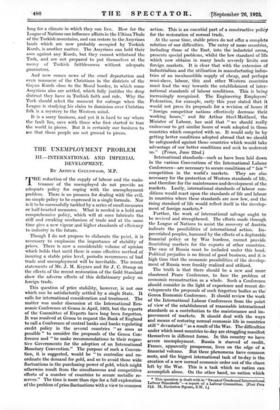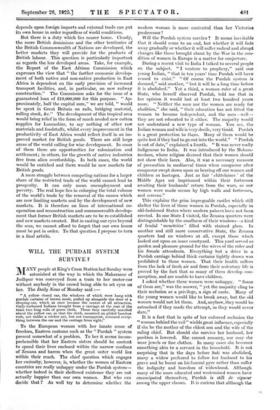THE UNEMPLOYMENT PROBLEM
III.—INTERNATIONAL AND IMPERIAL DEVELOPMENT.
BY ARTHUR GREENWOOD, M.P.
THEreduction of the supply of labour and the main- tenance of the unemployed do not provide an adequate policy for coping with the unemployment problem. There is no panacea for dealing with the evil, no simple policy to be expressed in a single formula. Nor is it to be successfully tackled by a series of small measures or half-hearted measures. What is needed is a bold and comprehensive policy, which will at once lubricate the stiff and creaking mechanism of trade and at the same time give a new vigour and higher standards of efficiency to industry in the future.
Though I do not propose to elaborate the point, it is necessary to emphasize the importance of stability of prices. There is now a considerable volume of opinion which holds that until there is some effective method of insuring a stable price level, periodic recurrences of bad trade and unemployment will be inevitable. The recent statements of Mr. J. M. Keynes and Sir J. C. Stamp on the effects of the recent restoration of the Gold Standard show the adverse effects of this deflationary policy on foreign trade.
This question of price stability, however, is not one which can be satisfactorily settled by a single State. It calls for international consideration and treatment. The matter was under discussion at the International Eco- nomic Conference at Genoa in April, 1922, but the reports of the Committee of Experts have long been forgotten. It was resolved at Genoa to request the Bank of England to call a Conference of central banks and banks regulating credit policy in the several countries " as soon as possible " to consider the proposals of the Genoa Con- ference and " to make recommendations to their respec- tive Governments for the adoption of an International Monetary Convention." The purpose of such a Conven- tion, it is suggested, would be " to centralize and co- ordinate the demand for gold, and so to avoid those wide fluctuations in the purchasing power of gold, which might otherwise result from the simultaneous and competitive efforts of a number of countries to secure metallic re serves." The time is more than ripe for a full exploration of the problem of price fluctuations with a view to common action. This is an essential part of a constructive policy for the restoration of normal trade.
At the same time, stable prices do not offer a complete solution of our difficulties. The entry of more countries, including those of the East, into the industrial arena, presents special problems, whilst the low standard of life which now obtains in many lands severely limits our foreign markets. It is clear that with the extension of industrialism and the utilization in manufacturing indus- tries of an inexhaustible supply of cheaK and perhaps semi-slave, labour, this and other Western countries must lead the way towards the establishnient of inter- national standards of labour conditions. This is being increasingly recognized. The Engineering Employers' Federation, for example, early this year stated that it would not press its proposals for a revision of hours if " foreign competitor nations effectively decrease their working hours," and Sir Arthur Steel-Maitland, the Minister of Labour, has said that " we should really, endeavour to get similar hours of work adopted in those countries which competed with us. It would only be by getting better conditions adopted abroad that we should be safeguarded against those countries which would take advantage of our better conditions and seek to undercut us." (Times, June 22nd.) International standards—such as have been laid down in the various Conventions of the International Labour Conferences—are necessary to secure conditions of " fair " competition in the world's markets. They are also necessary for the protection of Western standards of life,; and therefore for the maintenance and development of the markets. Lastly, international standards of labour con- ditions would react upon the standards of life and labour, in countries where these standards are now low, and the rising standard of life would reflect itself in the develop- ment of foreign markets.* Further, the work of international salvage ought to be revived and strengthened. The efforts made through the League of Nations to assist the recovery of Austria indicate the possibilities of international action. Im- poverished peoples, harassed by the effects of a deplorable financial policy or by War burdens, cannot provide flourishing markets for the exports of other countries.: The case of Russia must be included under this head.: Political prejudice is no friend of good business, and it is, high time that the economic possibilities of the develop-, ment of Russia were frankly realized and utilized.
The truth is that there should be a new and more chastened Peace Conference, to face the problem of economic reconstruction as a whole. Such a Conference should consider in the light of experience and recent de velopments the proposals of such forgotten bodies as the Genoa Economic Conference. It should review the work of the International Labour Conferences from the point of view of the establishment of reasonable international standards as a contribution to the maintenance and im- provement of markets. It should deal with the ways and means of restoring normal economic life in countries still " devastated " as a result of the War. The difficulties under which most countries to-day are struggling manifest themselves in different forms. In this country we have severe unemployment. Russia is starved of credit., France, apparently prosperous, lives on the edge of a financial volcano. But these phenomena have common roots, and the biggest international task of to-day is the, creation of a new normal economic order out of the chaos left by the War. This is a task which no nation can accomplish alone. On the other hand, no nation which
* This question is dealt with in " Sweated Goods and International' Labour Standards"--a report of a Labour Committee. (Post Free 2id. 33. Eccleston Square, S.W. 1.)
depends upon foreign imports and external trade can put its own house in order regardless' of world conditions.
But there is a duty which lies nearer home. Clearly, the more British dominions and the other territories of the British Commonwealth of Nations are developed, the better markets they will provide for the products of British labour. This question is particularly important as regards thq less developed areas. Take, for example, the Report of the East African Commission which expresses the view that " the further economic develop.. ment of both native and non-native production in East Africa is dependent on the early provision of increased transport facilities, and, in particular, on new railway construction." The Commission asks for the issue of a guaranteed loan of £10,000,000 for this purpose. " Ap- proximately, half the capital sum," we are told, " would be spent in Great Britain on rails, bridging material, rolling stock, &c." The development of this tropical area would bring relief in the form of much needed new cotton supplies for Lancashire, to say nothing of other raw materials and foodstuffs, whilst every improvement in the productivity of East Africa would reflect itself in an im- proved market for British goods. There are still large areas of the world calling for wise development. In some of them there are opportunities for colonization and settlement; in others, for the growth of native industries free from alien overlordship. In both cases, the world would be enriched and there would be new markets for British goods.
A mere struggle between competing nations for a larger share of the restricted trade of the world cannot lead to Prosperity. It can only mean unemployment and poverty. The real hope lies in enlarging the total volume of the world's trade by the removal of the causes which are now limiting markets and by the development of new markets. It is therefore on lines of international co- operation and reconstruction and commonwealth develop- ment that former British markets are to be re-established and new markets created. But in casting our eyes beyond the seas, we cannot afford to forget that our own house must be put in order. To that question I propose to turn in a final article.



















































 Previous page
Previous page